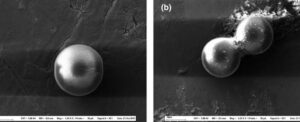Microplastics represent a threat to oceans, and it has been proved how much danger can cause to aquatic organisms and humans.
A new technique aims to fight that by eliminating one of the biggest contributors: the microfibers from our clothes. Could this really bring a change? Scientists think so.
Here is what you need to know.
Electrooxidation: What Should You Know
Our clothes are made out of polyester, acrylic, and nylon. Every time we wash them, tiny plastic microfibers are shed. Later, they would enter the wastewater and become a threat to our lives.Â
New research explains how only one clothing item can scatter millions of fibers during a typical wash. And such a thing should be enough to make us worry.Â
A new technique comes in help thanks to its potential to help eliminate plastic microfibers before reaching the environment. How could that be possible?
Electrooxidation in action
By catching and actively deconstructing microfibers, electrooxidation might prove to be our solution.Â
A team of researchers developed the method based on diamonds and titanium. The electrodes they used produced enough hydroxyl radicals to fight microplastics. The results are genuinely intriguing.

They found that the experiments using boron-doped diamond and titanium electrodes on the water full of polystyrene microfibers are very efficient. Up to 89 % of the plastic was degraded.
“This process is environmentally friendly because it breaks them [microfibers] down into CO2 and water molecules,” explained Patrick Drogui, one of the researchers.
What to Expect
As previously discussed, microplastics should concern us all. The danger is real, and it could negatively affect our environment and lives. Currently, 80 % of Earth’s wastewater isn’t treated at all before heading back into the environment. This alone should raise awareness.
Researchers hope that soon they will be able to integrate the new method in commercial laundries or even people’s washing machines. Other techniques are also revised to stop microplastics from reaching the ocean.Â












Leave a Reply